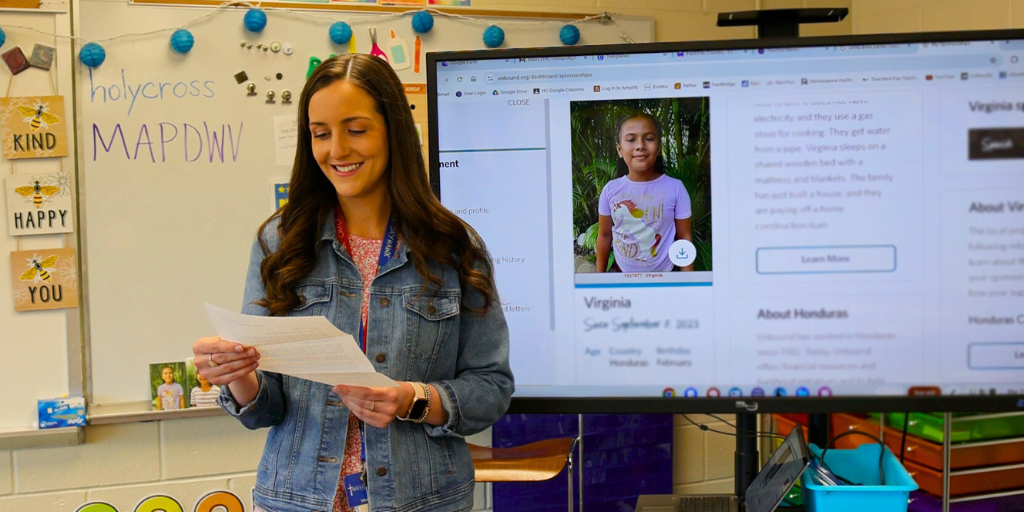
Tammy Marino of Unbound shares the value of helping children put faith into action to build empathy and global awareness.
As we reflect on Poverty Awareness Month (January) and Catholic Schools Week (January 26 through February 1) in an increasingly interconnected world, it is vital to nurture empathy and global awareness in the next generation.
Teaching children about the struggles and potential of others and fostering a sense of connection to the wider world helps develop their ability to care deeply and act responsibly. These values not only build compassionate individuals but also inspire collective action to address global challenges like poverty.
Parents as teachers
As parents, we are our children’s first, longest lasting and perhaps most important teachers. When we model true compassion, we not only ensure our children grow up to be caring members of society; indeed, we are gifting the future with empathetic change-makers.
Imagine sitting with your child, spinning the globe and finding a country she may want to learn more about. Imagine then finding a friend in that country, perhaps someone the same age as your child, who dreams of attending school to pursue his aspiration of becoming a teacher or doctor or musician and help his family to live better.
Unbound invites families to sponsor a child, older youth or elder and create connections, foster relationships and help transform lives across geographic, economic and social divides. Not only is the sponsor offering monetary support, but they are also offering encouragement. It costs relatively little but it’s life-changing for both parties. Many children and adults consider the opportunity to connect with someone struggling across the globe to be a true blessing.

How teachers can help
Global Classmates, an Unbound program designed especially for schools, offers students the opportunity to form a friendship with a student across the world while gaining global perspective and building character. It’s a way for students to put faith into action as they learn about respecting the dignity of all people, loving our neighbors near and far, prioritizing the needs of the poor and vulnerable and growing in community and solidarity with others.
By providing educators with lessons that foster empathy and knowledge around global issues, Global Classmates raises global awareness, develops key character traits and provides opportunities to serve others. The program allows teachers to connect their students in the United States with peers in developing countries through a combination of financial support and correspondence.
As students connect with their new friends, they have opportunities to develop their critical thinking and problem-solving skills as they read and write letters, participate in activities and raise awareness within their school environment. Through letter exchanges, children share experiences, stories and challenges. They learn about each other’s cultures, daily lives and aspirations. They see that despite geographical and socio-economic differences, they share many of the same hopes, dreams and challenges, and they gain insights into different cultures, personal stories and the difficulties of living in poverty. These exchanges not only deepen understanding but also highlight our shared humanity.
The program is available to educators and schools — secular and religious alike — and allows students to step out of their immediate, localized perspective and engage with realities faced by children in different parts of the world. These interactions humanize distant global issues, transforming abstract concepts like poverty, hunger and injustice into relatable, personal experiences.

Empathy, a cornerstone of faith and morality, is deeply rooted in Biblical teachings. Galatians 6:2 reminds us, “Bear one another’s burdens, and so you will fulfill the law of Christ.” In the Gospel of Matthew, Jesus commands His followers to love their neighbors as themselves (Matthew 22:39). The reminder to share the load that others carry and the call to love are not limited to those within one’s immediate circle but extends to all people, regardless of nationality, ethnicity or religion.
We must work toward reminding our children, and ourselves, that every person’s well-being is intertwined with the well-being of others. Worldwide empathy will mean a breakdown of prejudices, rejection of stereotypes and the building of meaningful connections across cultural divides — which will allow all people to understand and appreciate their own dignity and potential, the first step in battling poverty throughout the world.
Share your thoughts with the Catholic Mom community! You'll find the comment box below the author's bio and list of recommended articles.
Copyright 2025 Tammy Marino for Unbound
Images: Copyright 2025 Unbound.org, all rights reserved.
About the Author

Unbound
Unbound is an international nonprofit founded by lay Catholics grounded in the Gospel call to put the needs of the marginalized and vulnerable first. We build relationships of mutual respect and support that bridge cultural, religious and economic divides. We bring people together to challenge poverty in Africa, Asia, and Latin America. We invite you to join us. Find us on Facebook, Instagram, and YouTube.


.png?width=1806&height=731&name=CatholicMom_hcfm_logo1_pos_871c_2728c%20(002).png)
Comments